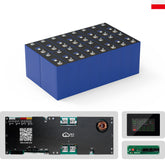Vollständiger Leitfaden zu AGM-Gel- und Blei-Säure-Batterien für Golfwagen
Die Wahl der richtigen Batterie für Ihren Golfwagen kann Leistung, Lebensdauer und Wartungsaufwand erheblich beeinflussen. Egal, ob Sie nur gelegentlich Golf spielen oder einen Golfwagen für Mobilität oder berufliche Aufgaben nutzen, die Auswahl an Batterieoptionen ist entscheidend. Dieser umfassende Leitfaden untersucht AGM-, Gel- und herkömmliche Blei-Säure-Batterien und hilft Ihnen, eine fundierte Entscheidung zu treffen.
- Die Grundlagen der Batterietypen für Golfwagen verstehen
- Leistungsvergleich der einzelnen Golfwagenbatterietypen
- Wartungsanforderungen für jede Golfwagenbatterie
- Kostenanalyse der Golfwagenbatterieoptionen
- Die beste Golfwagenbatterie für Ihre Bedürfnisse auswählen
Die Grundlagen der Batterietypen für Golfwagen verstehen
Golfwagenbatterien gibt es in verschiedenen Ausführungen, jede mit ihrem eigenen Design, ihrer chemischen Zusammensetzung und ihren Vor- und Nachteilen. Wir analysieren die wichtigsten Typen, um Ihnen die Besonderheiten der einzelnen Typen zu verdeutlichen.
Was ist eine Blei-Säure-Batterie?
Die Blei-Säure-Batterie ist der älteste und traditionellste Typ, der in Golfwagen verwendet wird. Sie besteht aus Bleiplatten, die in einen Schwefelsäureelektrolyt getaucht sind. Diese Batterien sind erschwinglich, leicht zu finden und in der Regel zuverlässig, was sie seit Jahrzehnten zu einer beliebten Wahl macht.
Vorteile:
Geringe Vorlaufkosten
Weit verbreitet
Einfach zu ersetzen oder zu recyceln
Nachteile:
Benötigt regelmäßige Pflege (Bewässerung)
Kürzere Zykluslebensdauer
Anfällig für Sulfatierung und Korrosion
>>Siehe auch: Auswahl zwischen 72-V- und 48-V-Golfwagen – Ein detaillierter Vergleich
Was ist eine Gelbatterie?
Gelbatterien sind eine Unterart der versiegelten Blei-Säure-Batterien. Anstelle von flüssigem Elektrolyt verwenden sie ein Gel auf Kieselgelbasis. Diese Konstruktion reduziert das Risiko des Auslaufens und macht die Batterie widerstandsfähiger gegen Vibrationen.
Vorteile:
Wartungsfrei
Auslaufsicher und sicherer
Längere Lebensdauer als Nassbatterien
Nachteile:
Empfindlich gegenüber Überladung
Teurer als geflutete Blei-Säure-Batterien
Geringere Stromabgabe bei hoher Belastung
Was ist eine AGM-Batterie?
Eine weitere versiegelte Blei-Säure-Option sind AGM-Batterien (Absorbent Glass Mat). Der Elektrolyt wird in Glasfasermatten zwischen den Platten absorbiert, was eine auslaufsichere Konstruktion und eine höhere Leistung in vielen Anwendungen ermöglicht.
Vorteile:
Wartungsfrei
Langlebig und vibrationsbeständig
Schnelleres Laden und höhere Leistungsabgabe
Nachteile:
Höhere Kosten
Empfindlich gegenüber Überladung
Kürzere Lebensdauer bei unsachgemäßer Aufladung
Leistungsvergleich der einzelnen Golfwagenbatterietypen
Bei der Bewertung von Golfwagenbatterien ist die Leistung ein entscheidender Faktor. Wie gut Ihr Wagen unter verschiedenen Bedingungen funktioniert, hängt maßgeblich von der darin enthaltenen Batterie ab.
Leistungsabgabe und Spannungsstabilität
AGM-Batterien bieten in der Regel die gleichmäßigste Leistungsabgabe, gefolgt von Gel- und anschließend gefluteten Blei-Säure-Batterien. AGM-Batterien können hohe Ströme für Beschleunigung und Bergauffahrten liefern.
Entladetiefe und Zykluslebensdauer
Gel-Batterien übertreffen aufgrund ihrer langsamen Selbstentladung und stabilen chemischen Struktur in der Regel andere Batterien hinsichtlich der Zyklenlebensdauer. AGM-Batterien bieten jedoch bei häufigem Gebrauch eine bessere Leistung.
Ladegeschwindigkeit
AGM-Batterien laden schneller als Gel- und Nassbatterien und sind daher ideal für Benutzer mit kurzen Ladezeiten. Nassbatterien laden am langsamsten und müssen sorgfältig überwacht werden, um eine Überladung zu vermeiden.
Wartungsanforderungen für jede Golfwagenbatterie
Bei der Auswahl einer Batterie für Ihren Golfwagen sollte die Wartung eine wichtige Rolle spielen. Der erforderliche Aufwand kann sich auf die langfristigen Kosten und den Komfort auswirken.
Wartung von Blei-Säure-Batterien
Nasse Blei-Säure-Batterien erfordern regelmäßige Kontrollen und Wartung:
Alle paar Wochen destilliertes Wasser hinzufügen
Reinigen Sie die Anschlüsse, um Korrosion zu vermeiden
Überwachen Sie den Ladezustand regelmäßig
Das Vernachlässigen dieser Schritte kann die Lebensdauer der Batterie drastisch verkürzen.
Wartung von AGM-Batterien
AGM-Batterien sind versiegelt, das heißt:
Kein Wasser hinzufügen nötig
Weniger anfällig für Anschlusskorrosion
Fordern Sie intelligente Ladegeräte, um Überladung zu vermeiden
Sie sind eine großartige Option für alle, die eine „Einstellen und Vergessen“-Lösung suchen.
Wartung der Gelbatterie
Gelbatterien sind ebenfalls versiegelt und wartungsfrei, erfordern aber:
Ladegeräte mit strenger Spannungsregelung
Temperaturüberwachung unter extremen Bedingungen
Trotz des geringen Wartungsaufwands kann die Verwendung eines ungeeigneten Ladegeräts die Lebensdauer der Gelbatterie drastisch verkürzen.
Kostenanalyse der Golfwagenbatterieoptionen
Bei den Kosten handelt es sich nicht nur um den Anschaffungspreis. Sie umfassen auch Betriebskosten, Austauschzyklen und langfristige Wartung.
Erstinvestition
Nasse Blei-Säure-Batterie: 90–150 USD pro Batterie
AGM: 150–300 USD pro Batterie
Gel: 200–350 USD pro Batterie
AGM- und Gel-Batterien erfordern zwar eine größere Anfangsinvestition, rechtfertigen die Kosten jedoch häufig durch die Langlebigkeit und den geringeren Wartungsaufwand.
Gesamtbetriebskosten
Wenn Sie Lebensdauer, Wartung und Zuverlässigkeit berücksichtigen:
Nassbatterien können bei guter Pflege 2–4 Jahre halten
AGM-Batterien können 4–6 Jahre halten
Gelbatterien können eine Lebensdauer von 5–7 Jahren erreichen
Auch wenn AGM und Gel zunächst teurer sind, können ihre längere Lebensdauer und der geringere Wartungsaufwand im Laufe der Zeit zu niedrigeren Gesamtkosten führen.
Die beste Golfwagenbatterie für Ihre Bedürfnisse auswählen
Welche Batterie für Ihr Golfcart die beste ist, hängt von Ihren Nutzungsgewohnheiten, Ihrem Budget und Ihrer Wartungsbereitschaft ab. So können Sie entscheiden:
Gelegentliche Nutzung und preisbewusste Käufer
Nasse Blei-Säure-Batterien sind möglicherweise am besten geeignet, wenn:
Sie verwenden Ihren Einkaufswagen selten
Sie sind mit regelmäßiger Wartung einverstanden
Sie möchten die niedrigsten Vorabkosten
Täglicher Gebrauch und geringer Wartungsbedarf
AGM-Batterien sind ideal, wenn:
Sie verwenden Ihren Einkaufswagen häufig
Sie möchten eine konstante Leistung
Sie bevorzugen eine wartungsfreie Lösung
Langfristige Investitionen und extreme Bedingungen
Wählen Sie Gelbatterien, wenn:
Sie arbeiten in heißen oder rauen Umgebungen
Sie legen Wert auf Sicherheit und Lebensdauer
Sie sind bereit, in ein kompatibles Ladegerät zu investieren
Umweltauswirkungen
Alle drei Batterietypen können recycelt werden, aber AGM- und Gel-Batterien verlieren weniger Säure und geben weniger Gase ab, was sie zu einer etwas umweltfreundlicheren Option macht.
>>Siehe auch: Ersetzen von Blei-Säure-Batterien durch Lithium in Elektromobilen
Häufig gestellte Fragen zu Golfwagen-Batterietypen
Welche Batterie hält in Golfwagen am längsten?
Gelbatterien haben unter optimalen Bedingungen normalerweise die längste Lebensdauer, insbesondere in Kombination mit einem geeigneten Ladegerät.
Kann ich verschiedene Batterietypen mischen?
Nein, Sie sollten niemals Batterien unterschiedlichen Typs oder Alters in einem Golfwagen mischen. Dies kann zu ungleichmäßiger Ladung, schlechter Leistung und möglichen Schäden führen.
Welche Spannung sollte ich für meinen Golfwagen wählen?
Die meisten Golfwagen verwenden entweder 36-V- oder 48-V-Systeme. Dies wird normalerweise durch die Verwendung mehrerer in Reihe geschalteter 6-V- oder 8-V-Batterien erreicht.
Wie oft sollte ich meinen Akku aufladen?
Laden Sie Ihren Akku idealerweise nach jedem Gebrauch auf. Lassen Sie ihn niemals über längere Zeit im entladenen Zustand, da dies zu Sulfatierung und einer verkürzten Lebensdauer führen kann.
Welches Ladegerät sollte ich verwenden?
Verwenden Sie ein Ladegerät, das speziell für Ihren Batterietyp entwickelt wurde. Gel-Batterien benötigen streng geregelte Ladegeräte, während AGM-Ladegeräte oft über intelligente Funktionen verfügen, um ein Überladen zu verhindern.
Die Wahl der richtigen Golfwagenbatterie kann komplex erscheinen, wird aber einfacher, wenn Sie die Unterschiede zwischen AGM-, Gel- und Blei-Säure-Batterien kennen. Nassbatterien sind zwar die kostengünstigsten, erfordern aber eine sorgfältige Wartung. AGM-Batterien bieten ein ausgewogenes Verhältnis zwischen Leistung und Komfort. Gel-Batterien bieten die längste Lebensdauer und das sicherste Design, erfordern aber kompatible Ladesysteme.
Bei Ihrer Entscheidung sollten Sie berücksichtigen, wie oft Sie den Wagen verwenden, wie das Klima in Ihrer Region ist und wie viel Sie bereit sind, in die Anschaffungskosten im Vergleich zur langfristigen Wartung zu investieren.
Letztendlich sorgt die richtige Batterie dafür, dass Ihr Golfwagen effizient läuft, seine Nutzungsdauer verlängert und Ihre langfristigen Ausgaben reduziert werden.
























Leave a comment
All blog comments are checked prior to publishing